Information injection-pump assembly
BOSCH
9 400 612 515
9400612515
ZEXEL
108622-4031
1086224031
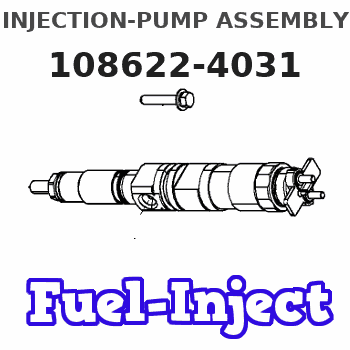
Rating:
Service parts 108622-4031 INJECTION-PUMP ASSEMBLY:
1.
_
5.
AUTOM. ADVANCE MECHANIS
9.
_
11.
Nozzle and Holder
12.
Open Pre:MPa(Kqf/cm2)
15.
NOZZLE SET
Include in #1:
108622-4031
as INJECTION-PUMP ASSEMBLY
Cross reference number
BOSCH
9 400 612 515
9400612515
ZEXEL
108622-4031
1086224031
Zexel num
Bosch num
Firm num
Name
108622-4031
9 400 612 515
DAEWOO
INJECTION-PUMP ASSEMBLY
DE12TIS K 14CJ INJECTION PUMP ASSY TICS HD-TI6M TICS
DE12TIS K 14CJ INJECTION PUMP ASSY TICS HD-TI6M TICS
Calibration Data:
Adjustment conditions
Test oil
1404 Test oil ISO4113 or {SAEJ967d}
1404 Test oil ISO4113 or {SAEJ967d}
Test oil temperature
degC
40
40
45
Nozzle and nozzle holder
105780-8250
Bosch type code
1 688 901 101
Nozzle
105780-0120
Bosch type code
1 688 901 990
Nozzle holder
105780-2190
Opening pressure
MPa
20.7
Opening pressure
kgf/cm2
211
Injection pipe
Outer diameter - inner diameter - length (mm) mm 8-3-600
Outer diameter - inner diameter - length (mm) mm 8-3-600
Overflow valve
134424-4120
Overflow valve opening pressure
kPa
255
221
289
Overflow valve opening pressure
kgf/cm2
2.6
2.25
2.95
Tester oil delivery pressure
kPa
255
255
255
Tester oil delivery pressure
kgf/cm2
2.6
2.6
2.6
PS/ACT control unit part no.
407980-2
24*
Digi switch no.
31
Direction of rotation (viewed from drive side)
Right R
Right R
Injection timing adjustment
Direction of rotation (viewed from drive side)
Right R
Right R
Injection order
1-5-3-6-
2-4
Pre-stroke
mm
6.4
6.37
6.43
Beginning of injection position
Governor side NO.1
Governor side NO.1
Difference between angles 1
Cal 1-5 deg. 60 59.75 60.25
Cal 1-5 deg. 60 59.75 60.25
Difference between angles 2
Cal 1-3 deg. 120 119.75 120.25
Cal 1-3 deg. 120 119.75 120.25
Difference between angles 3
Cal 1-6 deg. 180 179.75 180.25
Cal 1-6 deg. 180 179.75 180.25
Difference between angles 4
Cyl.1-2 deg. 240 239.75 240.25
Cyl.1-2 deg. 240 239.75 240.25
Difference between angles 5
Cal 1-4 deg. 300 299.75 300.25
Cal 1-4 deg. 300 299.75 300.25
Injection quantity adjustment
Adjusting point
-
Rack position
14.35
Pump speed
r/min
630
630
630
Average injection quantity
mm3/st.
135
132
138
Max. variation between cylinders
%
0
-2
2
Basic
*
Fixing the rack
*
PS407980-224*
V
2.45+-0.
01
PS407980-224*
mm
4+-0.05
Standard for adjustment of the maximum variation between cylinders
*
Injection quantity adjustment_02
Adjusting point
Z
Rack position
8.9+-0.5
Pump speed
r/min
445
445
445
Average injection quantity
mm3/st.
13.5
12
15
Max. variation between cylinders
%
0
-15
15
Fixing the rack
*
PS407980-224*
V
V1+0.05+
-0.01
PS407980-224*
mm
6.3+-0.0
3
Standard for adjustment of the maximum variation between cylinders
*
Remarks
Refer to items regarding the pre-stroke actuator
Refer to items regarding the pre-stroke actuator
Injection quantity adjustment_03
Adjusting point
A
Rack position
R1(14.35
)
Pump speed
r/min
630
630
630
Average injection quantity
mm3/st.
135
133
137
Basic
*
Fixing the lever
*
Boost pressure
kPa
75.3
75.3
Boost pressure
mmHg
565
565
PS407980-224*
V
2.45+-0.
01
PS407980-224*
mm
4+-0.05
Injection quantity adjustment_04
Adjusting point
B
Rack position
(R1+0.9)
Pump speed
r/min
1050
1050
1050
Average injection quantity
mm3/st.
123
117
129
Fixing the lever
*
Boost pressure
kPa
75.3
75.3
Boost pressure
mmHg
565
565
PS407980-224*
V
2.45+-0.
01
PS407980-224*
mm
4+-0.05
Boost compensator adjustment
Pump speed
r/min
250
250
250
Rack position
R2-2.5
Boost pressure
kPa
10.7
9.4
12
Boost pressure
mmHg
80
70
90
Boost compensator adjustment_02
Pump speed
r/min
250
250
250
Rack position
R2(R1+0.
15)
Boost pressure
kPa
62
62
62
Boost pressure
mmHg
465
465
465
0000001601
Pre-stroke
mm
6.4
6.37
6.43
Remarks
When the timing sleeve is pushed up
When the timing sleeve is pushed up
_02
Connector angle
deg.
8.5
8
9
Remarks
When the eccentric pin is tightened
When the eccentric pin is tightened
_03
Supply voltage
V
24
23.5
24.5
Ambient temperature
degC
23
18
28
Pre-stroke
mm
4
3.95
4.05
Output voltage
V
2.45
2.44
2.46
Adjustment
*
_04
Supply voltage
V
24
23.5
24.5
Ambient temperature
degC
23
18
28
Pre-stroke
mm
6.4
6.37
6.43
Output voltage
V
1.2
1
1.4
Confirmation
*
Remarks
Output voltage V1
Output voltage V1
_05
Supply voltage
V
24
23.5
24.5
Ambient temperature
degC
23
18
28
Pre-stroke
mm
3.4
Output voltage
V
3
2.98
3
Confirmation
*
_06
Supply voltage
V
24
23.5
24.5
Ambient temperature
degC
23
18
28
Output voltage
V
3.05
3.05
Confirmation of operating range
*
Test data Ex:
Governor adjustment
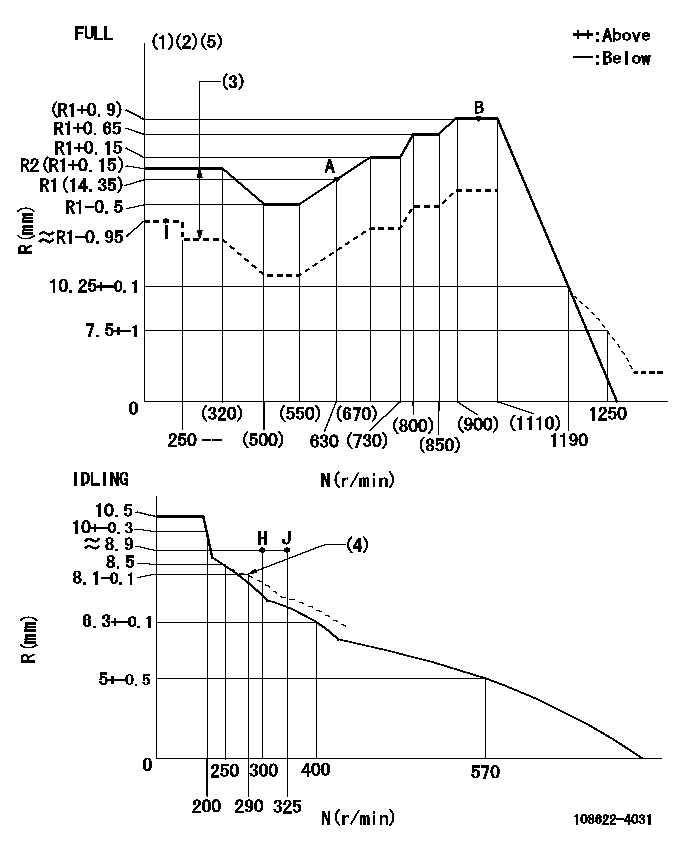
N:Pump speed
R:Rack position (mm)
(1)Torque cam stamping: T1
(2)Tolerance for racks not indicated: +-0.05mm.
(3)Boost compensator stroke: BCL
(4)Damper spring setting
(5)Microswitch adjustment unnecessary (deliver with adjusting bolt fully backed off).
----------
T1=AG98 BCL=2.5+-0.1mm
----------
----------
T1=AG98 BCL=2.5+-0.1mm
----------
Speed control lever angle
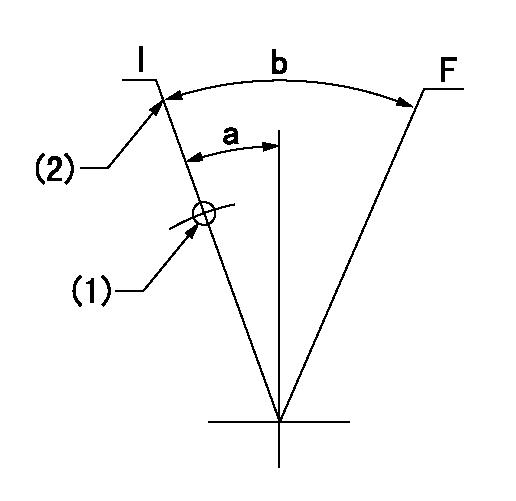
F:Full speed
I:Idle
(1)Use the hole at R = aa
(2)Stopper bolt set position 'H'
----------
aa=70.3mm
----------
a=10.5deg+-5deg b=38deg+-3deg
----------
aa=70.3mm
----------
a=10.5deg+-5deg b=38deg+-3deg
Stop lever angle
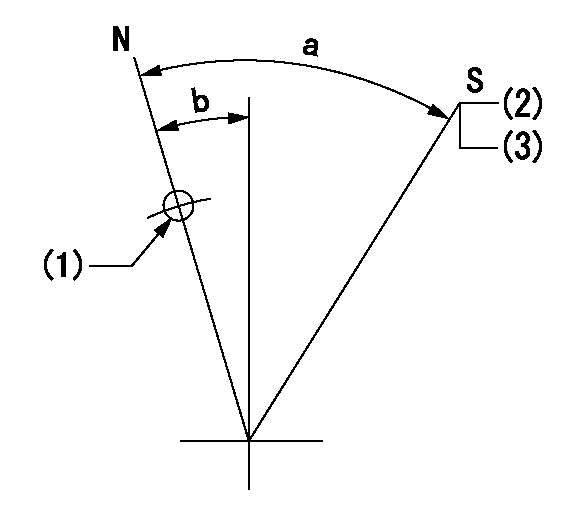
N:Pump normal
S:Stop the pump.
(1)Use the hole at R = aa
(2)Speed = bb, rack position = cc
(3)Set the stopper screw. (After setting, apply red paint.)
----------
aa=40mm bb=0r/min cc=1.5+-0.3mm
----------
a=44deg+-5deg b=20deg+-5deg
----------
aa=40mm bb=0r/min cc=1.5+-0.3mm
----------
a=44deg+-5deg b=20deg+-5deg
0000001301
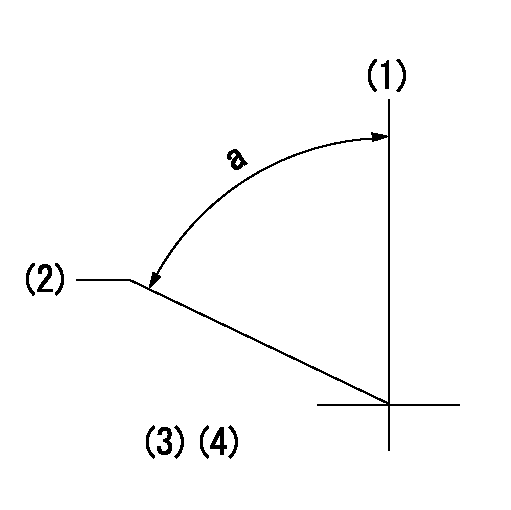
(1)Pump vertical direction
(2)Coupling's key groove position at No 1 cylinder's beginning of injection
(3)Pre-stroke: aa
(4)-
----------
aa=6.4+-0.03mm
----------
a=(70deg)
----------
aa=6.4+-0.03mm
----------
a=(70deg)
0000001901
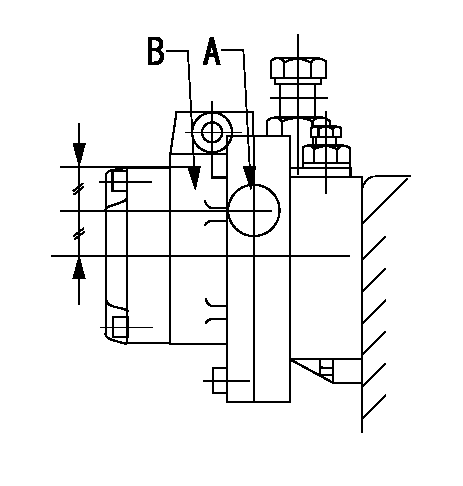
A:Sealing position
B:Pre-stroke actuator
1. When installing the pre-stroke actuator on the pump, first tighten the installation bolts loosely, then move the actuator fully counterclockwise (viewed from the drive side).
Temporary tightening torque: 1 - 1.5 N.m (0.1 - 0.15 kgf.m)
2. Move the actuator in the clockwise direction when viewed from the drive side, and adjust so that it becomes the adjustment point of the adjustment value. Then tighten it.
Tightening torque: 7^9 N.m (0.7^0.9 kgf.m)
3. After prestroke actuator installation adjustment, simultaneously stamp both the actuator side and housing side.
----------
----------
----------
----------
0000002201 RACK SENSOR
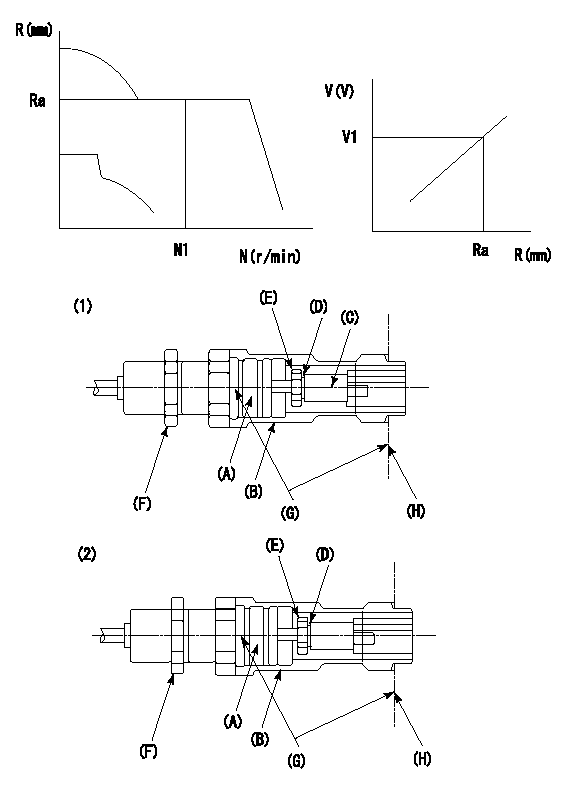
G:Red paint
H:Pump end face
P/N: part number of suitable shim
(1)Threaded type rack block
(2)Welded type rack block
Rack sensor adjustment
1. Threaded type rack sensor (-5*20, P type, no TICS rack limit).
(1)Screw in the bobbin (A) until it contacts the joint (B).
(2)Fix the pump lever.
(3)At speed N1 and rack position Ra, adjust the amount that the bobbin is screwed in so that the amp's output voltage is V1.
(4)Fix using the nut (F).
(5)Affix the caution plate to the upper part of the joint (B).
(6)Apply (G) at two places.
Connecting part between the joint (B) and the nut (F)
Connecting part between the end surface of the pump (H) and the joint (B)
2. Range for screw-in adjustment between the bobbin (A) and the joint (B) is 9 threads.
Screw in to the end from (the position where the bobbin (A) is rotated 9 turns).
Speed N1, rack position Ra, output voltage V1, rack sensor supply voltage 5+-0.01 (V)
----------
Ra=(R1(14.35)+0.9)mm N1=1050r/min V1=3+-0.01V
----------
----------
Ra=(R1(14.35)+0.9)mm N1=1050r/min V1=3+-0.01V
----------
Information:
Oils
Hot oil and components can cause personal injury. Do not allow hot oil or components to contact the skin.Keep all exhaust manifold and turbocharger shields in place to protect hot exhaust from oil spray in the event of a line, tube or seal failure.Batteries
Battery electrolyte contains acid and can cause injury. Avoid contact with the skin and eyes.Wash hands after touching batteries and connectors. Use of gloves is recommended.Batteries give off flammable fumes which can explode. Ensure there is proper ventilation for batteries which are located in an enclosure.Always thaw a frozen battery before jump starting. Frozen batteries can explode.Do not smoke when observing battery electrolyte levels.Always wear protective glasses when working with batteries.Never disconnect any charging unit circuit or battery circuit cable from the battery when charging unit is operating. A spark can cause the flammable vapor mixture of hydrogen and oxygen to explode.Fire or Explosion Prevention
Fire may result from lubricating oil or fuel sprayed on hot surfaces causing personal injury and property damage. Inspect all lines and tubes for wear or deterioration. They must be routed, supported or clamped securely. Tighten all connections to the recommended torque. Leaks can cause fires.Determine whether the engine will be operated in an environment in which combustible gases could be drawn through the air inlet system. These gases could cause the engine to overspeed, which in turn could seriously damage the engine and result in bodily injury or property damage.If your application involves the presence of combustible gases, consult your Caterpillar dealer to obtain additional information concerning protection devices (i.e. air inlet shutoff) suitable for the application involved.All fuels, most lubricants and some coolant mixtures are flammable.Diesel fuel is flammable. Gasoline is flammable. The mixture of diesel and gasoline fumes is extremely explosive.Do not smoke while refueling or in a refueling area.Do not smoke in areas where batteries are charged, or where flammable materials are stored.Batteries give off flammable fumes which can explode.Keep all fuels and lubricants stored in properly marked containers and away from all unauthorized persons.Store all oily rags or other flammable material in a protective container, in a safe place.Do not weld or flame cut on pipes or tubes that contain flammable fluids. Clean them thoroughly with nonflammable solvent before welding or flame cutting on them.Remove all flammable materials such as fuel, oil and other debris before they accumulate on the engine.Do not expose the engine to flames, burning brush, etc., if at all possible.Shields (if equipped), which protect hot exhaust components from oil or fuel spray in the event of a line, tube or seal failure, must be installed correctly.Provide adequate and proper waste oil disposal. Oil and fuel filters must be properly installed and housing covers tightened to proper torque when being changed.Batteries must be kept clean, covers kept on all cells, recommended cables and connections used and battery box covers kept in place when operating.When starting from an external source, always connect the positive (+) jumper cable to the POSITIVE (+) terminal of the
Hot oil and components can cause personal injury. Do not allow hot oil or components to contact the skin.Keep all exhaust manifold and turbocharger shields in place to protect hot exhaust from oil spray in the event of a line, tube or seal failure.Batteries
Battery electrolyte contains acid and can cause injury. Avoid contact with the skin and eyes.Wash hands after touching batteries and connectors. Use of gloves is recommended.Batteries give off flammable fumes which can explode. Ensure there is proper ventilation for batteries which are located in an enclosure.Always thaw a frozen battery before jump starting. Frozen batteries can explode.Do not smoke when observing battery electrolyte levels.Always wear protective glasses when working with batteries.Never disconnect any charging unit circuit or battery circuit cable from the battery when charging unit is operating. A spark can cause the flammable vapor mixture of hydrogen and oxygen to explode.Fire or Explosion Prevention
Fire may result from lubricating oil or fuel sprayed on hot surfaces causing personal injury and property damage. Inspect all lines and tubes for wear or deterioration. They must be routed, supported or clamped securely. Tighten all connections to the recommended torque. Leaks can cause fires.Determine whether the engine will be operated in an environment in which combustible gases could be drawn through the air inlet system. These gases could cause the engine to overspeed, which in turn could seriously damage the engine and result in bodily injury or property damage.If your application involves the presence of combustible gases, consult your Caterpillar dealer to obtain additional information concerning protection devices (i.e. air inlet shutoff) suitable for the application involved.All fuels, most lubricants and some coolant mixtures are flammable.Diesel fuel is flammable. Gasoline is flammable. The mixture of diesel and gasoline fumes is extremely explosive.Do not smoke while refueling or in a refueling area.Do not smoke in areas where batteries are charged, or where flammable materials are stored.Batteries give off flammable fumes which can explode.Keep all fuels and lubricants stored in properly marked containers and away from all unauthorized persons.Store all oily rags or other flammable material in a protective container, in a safe place.Do not weld or flame cut on pipes or tubes that contain flammable fluids. Clean them thoroughly with nonflammable solvent before welding or flame cutting on them.Remove all flammable materials such as fuel, oil and other debris before they accumulate on the engine.Do not expose the engine to flames, burning brush, etc., if at all possible.Shields (if equipped), which protect hot exhaust components from oil or fuel spray in the event of a line, tube or seal failure, must be installed correctly.Provide adequate and proper waste oil disposal. Oil and fuel filters must be properly installed and housing covers tightened to proper torque when being changed.Batteries must be kept clean, covers kept on all cells, recommended cables and connections used and battery box covers kept in place when operating.When starting from an external source, always connect the positive (+) jumper cable to the POSITIVE (+) terminal of the
Have questions with 108622-4031?
Group cross 108622-4031 ZEXEL
Daewoo
108622-4031
9 400 612 515
INJECTION-PUMP ASSEMBLY
DE12TIS
DE12TIS
